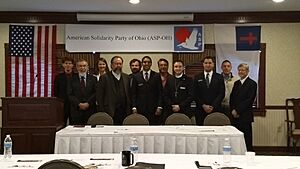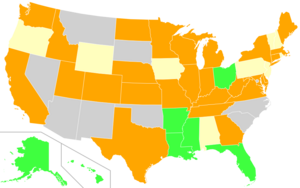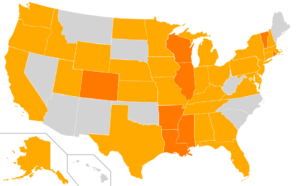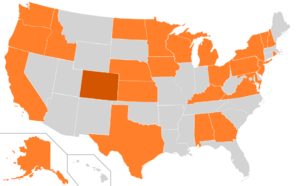American Solidarity Party facts for kids
Quick facts for kids
American Solidarity Party
|
|
|---|---|
 |
|
| Leader | Marcos Lopez (as Executive Director) |
| Chairperson | Jack Ternan |
| Founded | 2016 |
| Youth wing | Young Americans for Solidarity |
| Ideology | Christian democracy Distributism Social market economy |
| Political position | Syncretic Fiscal: Center-left Social: Center-right |
| Colors | Orange |
| Slogan | "Pro Life, Pro Family, Pro Worker" |
| Seats in the Senate |
0 / 100
|
| Seats in the House |
0 / 435
|
| Governorships |
0 / 50
|
| State Upper House Seats |
0 / 1,972
|
| State Lower House Seats |
0 / 5,411
|
| Other elected officials | 3 |
The American Solidarity Party (ASP) is a political party in the United States. Its ideas are based on Christian democracy, a political movement popular in Europe and other parts of the world. The party was started in 2011 and became official in 2016.
The ASP has a national committee and many local groups in different states. The party is often described as being socially conservative, meaning it holds traditional values on social topics. At the same time, it supports government action to help the economy and its citizens.
The party believes in the importance of strong families and local communities. It supports economic ideas like distributism, which aims for more people to own businesses and property. The ASP also supports having a social safety net to help people in need. In the 2024 United States presidential election, the party's candidate was Peter Sonski.
History
The American Solidarity Party was founded in 2011. Its original name was the Christian Democratic Party USA (CDPUSA). The founders were David "Frost" Harris, Kirk Morrison, and Jack Quirk.
The name "Solidarity" was inspired by a famous Polish trade union. The party's mascot is the pelican, which is a traditional symbol for charity and helping others.
In 2012, the party supported Joe Schriner, an independent candidate for president. By 2020, the ASP had grown enough to join the Coalition for Free and Open Elections (COFOE), a group that works to make elections fair for all parties.
What the Party Believes
The American Solidarity Party's main ideas come from Christian democracy. This political viewpoint is influenced by Catholic social teaching and the ideas of other Christian groups. The ASP is similar to Christian democratic parties in Europe and the Americas.
The party is sometimes called communitarian because it focuses on the good of the community. It mixes conservative ideas on social issues with more liberal ideas on economic issues.
Social Issues
The ASP believes in the "sanctity of human life." Because of this, the party is against the death penalty. It also believes that the traditional family is a key part of a healthy society.
On immigration, the party wants a caring approach. It supports secure borders but also wants to treat immigrants with dignity. The ASP believes it's important to understand why people migrate, including how U.S. actions in other countries might play a role.
Economic Issues
The ASP supports a universal health care system, where everyone has access to medical care. The party also wants an economy where more people own the places they work. This idea, called distributism, encourages worker-owned businesses and more control for employees.
Foreign Policy
In world affairs, the American Solidarity Party is non-interventionist. This means it believes the U.S. should avoid getting involved in wars in other countries. The party supports using peaceful talks and foreign aid to solve problems instead of military force.
Fixing Elections
The ASP wants to change the way elections work in the U.S. The party supports electoral reform to fight against what it sees as a system controlled by a few powerful people.
Some of their ideas include:
- Using proportional representation for the House of Representatives.
- Using ranked-choice voting for all elections.
- Making it easier for people to register to vote.
- Ensuring that independent and third-party candidates have fair access to be on the ballot.
Elections and Candidates
2016 Presidential Election
In 2016, the ASP nominated Mike Maturen for president and Juan Muñoz for vice president. The party was on the ballot in Colorado and was a write-in choice in 18 other states. Maturen received 6,697 votes.
2018 Elections
In 2018, Desmond Silveira ran for governor of California and received 4,633 votes in the primary. Brian T. Carroll ran for a seat in the U.S. Congress in California and got 1,591 votes in the primary.
2020 Presidential Election
For the 2020 U.S. presidential election, the ASP nominated Brian T. Carroll for president. The party was on the ballot in nine states and territories, including Colorado, Illinois, and Wisconsin. It was a write-in option in 31 other states. Carroll received 42,305 votes nationwide.
2022 Elections
In 2022, several ASP members ran for office.
- Dr. James G. Hanink ran for governor of California and received 10,110 votes.
- Dr. Mark A. Ruzon and Desmond A. Silveira ran as write-in candidates for U.S. Senate and Secretary of State in California.
- Dr. Jacqueline Abernathy was a write-in candidate for governor of Texas, getting 1,326 votes.
2024 Presidential Election
Peter Sonski won the party's nomination for president in June 2023. His running mate for vice president was Lauren Onak.
The party was on the ballot in eight states, including Arkansas, Florida, and Ohio. It was also an official write-in option in over 30 other states. The ticket received 46,472 votes.
Also in 2024, Dr. Mark Ruzon ran for the U.S. Senate in California, receiving over 13,000 votes in the primary. Erskine Levi Jr. ran for a U.S. House seat in California, and Analisa Roche ran as a write-in for the U.S. Senate in Texas.
Presidential Tickets
| Election | Name | Running Mate | Campaign Announcement date |
Votes |
|---|---|---|---|---|
| 2024 | 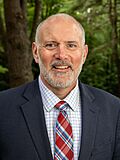 Peter Sonski Member Regional School District 17 board of education in Connecticut |
 Lauren Onak Community organizer, non-profit executive, and teacher in Massachusetts |
 Campaign: February 20, 2023 Nomination: June 2, 2023 |
46,472 (#8) 0 EV |
| 2020 | 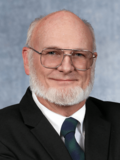 Brian Carroll Teacher from California |
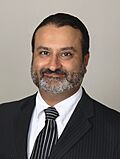 Amar Patel National Committee Chair of the American Solidarity Party from Illinois |
 Campaign: April 2, 2019 Nomination: September 9, 2019 FEC Filing |
42,305 (#10) 0 EV |
| 2016 | Mike Maturen replacing Amir Azarvan Salesperson from Michigan |
Juan Muñoz replacing Mike Maturen State Party Chair from Texas |
 FEC Filing |
6,697 (#15) 0 EV |
Presidential Election Results
The American Solidarity Party has worked to get its presidential candidates on the ballot in more states with each election. Being "on the ballot" means the candidate's name is printed for voters to choose. A "write-in" means voters have to write the candidate's name themselves.
Below is a table showing the party's results in presidential elections.
| Year | 2016 | 2020 | 2024 |
|---|---|---|---|
| Party nominees | Mike Maturen (president) Juan Muñoz (vice president) |
Brian T. Carroll (president) Amar Patel (vice president) |
Peter Sonski (president) Lauren Onak (vice president) |
| States & D.C. ballot access (write-in access) |
1 (25) | 8 (31) | 7 (45) |
| Ballot access to electoral votes (write-in access) |
9 (323) | 66 (397) | 74 (480) |
| Alabama | Unreported | Unreported | Unreported |
| Alaska | Unreported | Unreported | 702 |
| Arizona | |||
| Arkansas | 1,713 | 2,141 | |
| California | 1,316 | 2,605 | 2,924 |
| Colorado | 862 | 2,515 | 910 |
| Connecticut | 220 | 162 | |
| Delaware | 87 | 98 | |
| District of Columbia | |||
| Florida | 854 | 7,454 | |
| Georgia | 151 | 756 | 730 |
| Guam (advisory) | 138 | 46 | |
| Hawaii | 936 | ||
| Idaho | 35 | 163 | 239 |
| Illinois | 9,548 | 1,391 | |
| Indiana | 895 | 1,347 | |
| Iowa | Unreported | Unreported | 195 |
| Kansas | 214 | 583 | 569 |
| Kentucky | 155 | 408 | 611 |
| Louisiana | 2,497 | 2,240 | |
| Maine | 65 | ||
| Maryland | 504 | 795 | 1,012 |
| Massachusetts | 164 | 280 | |
| Michigan | 517 | 963 | 1,212 |
| Minnesota | 244 | 1,037 | 882 |
| Mississippi | 1,161 | 1,007 | |
| Missouri | 664 | 1,069 | |
| Montana | |||
| Nebraska | Unreported | Unreported | Unreported |
| Nevada | |||
| New Hampshire | Unreported | 79 | 159 |
| New Jersey | Unreported | 330 | 385 |
| New Mexico | |||
| New York | 409 | 892 | 1,544 |
| North Carolina | |||
| North Dakota | Unreported | 36 | |
| Ohio | 552 | 1,450 | 10,197 |
| Oklahoma | |||
| Oregon | Unreported | Unreported | |
| Pennsylvania | Unreported | 1,164 | 829 |
| Rhode Island | 34 | 767 | |
| South Carolina | |||
| South Dakota | |||
| Tennessee | 762 | ||
| Texas | 1,401 | 3,207 | 3,780 |
| Utah | 368 | 441 | |
| Vermont | 19 | 209 | 55 |
| Virginia | Unreported | Unreported | 32 |
| Washington | Unreported | 18 | |
| West Virginia | 63 | ||
| Wisconsin | 284 | 5,259 | 647 |
| Wyoming | Unreported | ||
| Total | 6,697 | 42,305 | 46,472 |
| Legend | |
|---|---|
| Listed on ballot | |
| Registered as write-in candidate | |
| Write-in candidates allowed without registration | |
| Not a candidate in the state/territory/district | |
Notable party supporters
- Stephen Bainbridge, UCLA law professor
- Charles A. Coulombe, Catholic author, historian, and lecturer
- Patrick Deneen, author and member of ASP board of advisors
- Rod Dreher, senior editor and blogger at The American Conservative and author
- Dan Lipinski, former US representative
- Terry Mattingly, journalist, author, and professor
- George Yancey, sociologist and professor of sociology at Baylor University
- Howard Ahmanson Jr., philanthropist and writer
See also
- Center for Public Justice
- Communitarianism
- Prohibition Party
- Social market economy
- Social conservatism in the United States
- Social Gospel
- Subsidiarity
 | Emma Amos |
 | Edward Mitchell Bannister |
 | Larry D. Alexander |
 | Ernie Barnes |


